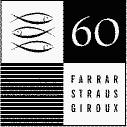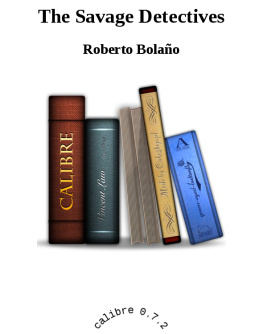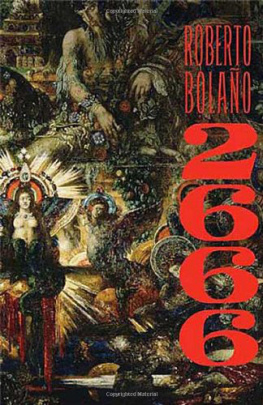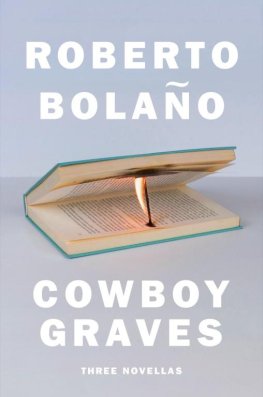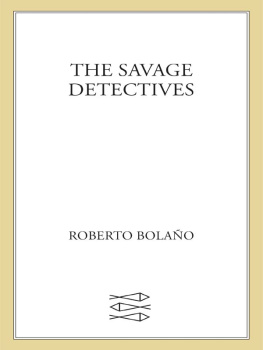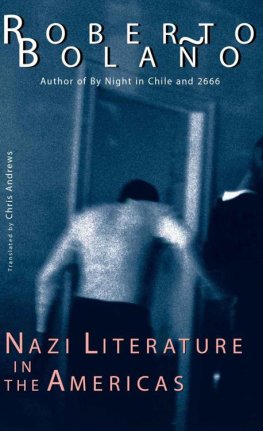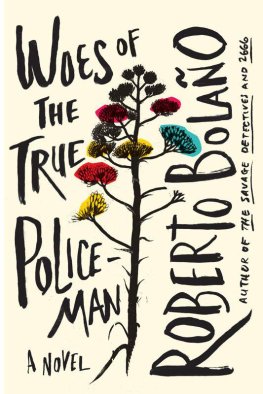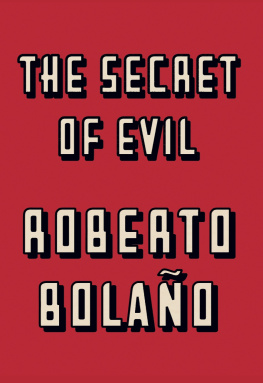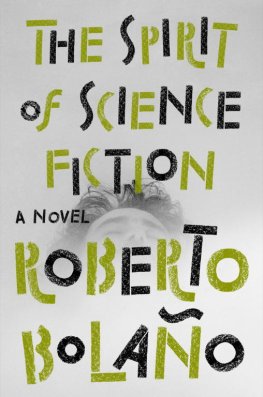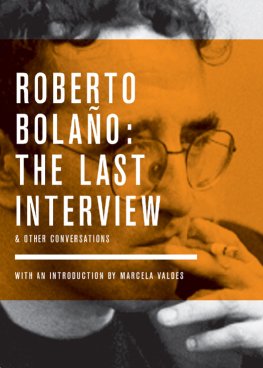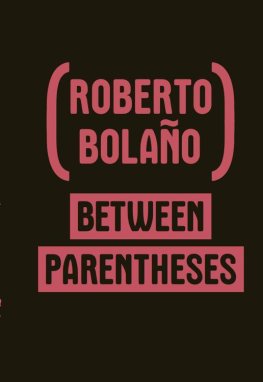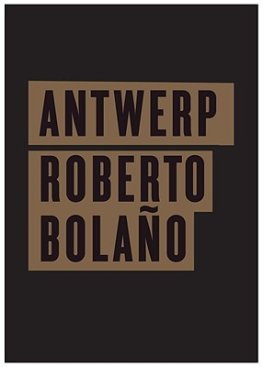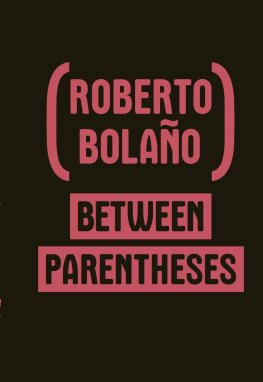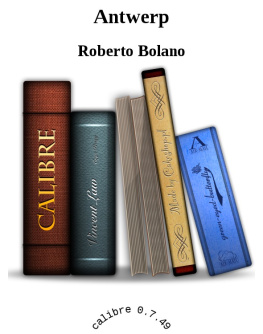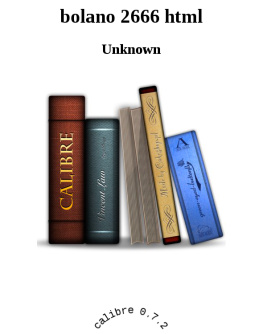This page intentionally left blank
THE SAVAGE DETECTIVES
This page intentionally left blank
THE SAVAGE DETECTIVES
ROBERTO BOLAO
TRANSLATED FROM THE SPANISH BY NATASHA WIMMER
Farrar, Straus and Giroux19 Union Square West, New York 10003Copyright 1998 by Roberto BolaoTranslation copyright 2007 by Natasha WimmerAll rights reservedDistributed in Canada by Douglas & McIntyre Ltd.Printed in the United States of AmericaOriginally published in 1998 by Editorial Anagrama, Spain, as
Los detectives salvajesPublished in the United States by Farrar, Straus and GirouxFirst American edition, 2007Grateful acknowledgment is made for permission to reprint the following material:"The Vampire," by Octavio Paz, translated by Samuel Beckett, from
Anthology of Mexican Poetry, 1970 by Calder & Boyars. Reprinted by permission of John Calder.All rights reserved."A Philosophical Satire," translated by Margaret Sayers Peden, from
Sor Juana Ins de la
Cruz: Poems, 1985 by Bilingual Press/Editorial Bilinge, Arizona State University,Tempe. Used by permission. All rights reserved.Library of Congress Cataloging-in-Publication DataBolao, Roberto, 1953[Detectives salvajes. English]The savage detectives/Roberto Bolao ; translated from the Spanish by Natasha Wimmer.1st American ed.p. cm.ISBN-13: 978-0-374-19148-1 (hardcover : alk. paper)ISBN-10: 0-374-19148-4 (hardcover : alk. paper)I. Wimmer, Natasha. II. Title.PQ8098.12.O38D4813 2007863'.64dc222006022176Designed by Jonathan D. Lippincottwww.fsgbooks.com [http://www.fsgbooks.com]1 2 3 4 5 6 7 8 9 10This work has been published with a subsidy from the Directorate-General of Books,Archives and Libraries of the Spanish Ministry of Culture.
For Carolina Lpez and Lautaro Bolao,
who have the good fortune to look alike
This page intentionally left blank
"Do you want Mexico to be saved? Do you want Christ to be our king?""No."
Malcolm Lowry
This page intentionally left blank
I
MEXICANS LOST IN MEXICO
(1975)
This page intentionally left blank
NOVEMBER 2I've been cordially invited to join the visceral realists. I accepted, of course. There was no initiation ceremony. It was better that way.NOVEMBER 3I'm not really sure what visceral realism is. I'm seventeen years old, my name is Juan Garca Madero, and I'm in my first semester of law school. I wanted to study literature, not law, but my uncle insisted, and in the end I gave in. I'm an orphan, and someday I'll be a lawyer. That's what I told my aunt and uncle, and then I shut myself in my room and cried all night. Or anyway for a long time. Then, as if it were settled, I started class in the law school's hallowed halls, but a month later I registered for Julio Csar lamo's poetry workshop in the literature department, and that was how I met the visceral realists, or viscerealists or even vicerealists, as they sometimes like to call themselves. Up until then, I had attended the workshop four times and nothing ever happened, though only in a manner of speaking, of course, since naturally something always happened: we read poems, and lamo praised them or tore them to pieces, depending on his mood; one person would read, lamo would critique, another person would read, lamo would critique, somebody else would read, lamo would critique. Sometimes lamo would get bored and ask us (those of us who weren't reading just then) to critique too, and then we would critique and lamo would read the paper.It was the ideal method for ensuring that no one was friends with anyone, or else that our friendships were unhealthy and based on resentment. And I can't say that lamo was much of a critic either, even though he talked a lot about criticism. Really I think he just talked for the sake of talking. He knew what periphrasis was. Not very well, but he knew. But he didn't know what pentapody was (a line of five feet in classical meter, as everybody knows), and he didn't know what a nicharchean was either (a line something like the phalaecean), or what a tetrastich was (a four-line stanza). How do I know he didn't know? Because on the first day of the workshop, I made the mistake of asking. I have no idea what I was thinking. The only Mexican poet who knows things like that by heart is Octavio Paz (our great enemy), the others are clueless, or at least that was what Ulises Lima told me minutes after I joined the visceral realists and they embraced me as one of their own. Asking lamo these questions was, as I soon learned, a sign of my tactlessness. At first I thought he was smiling in admiration. Later I realized it was actually contempt. Mexican poets (poets in general, I guess) hate to have their ignorance brought to light. But I didn't back down, and after he had ripped apart a few of my poems at the second session, I asked him whether he knew what a rispetto was. lamo thought that I was demanding
respect for my poems, and he went off on a tirade about objective criticism (for a change), a minefield that every young poet must cross, etc., but I cut him off, and after explaining that never in my short life had I demanded respect for my humble creations, I put the question to him again, this time enunciating as clearly as possible."Don't give me this crap," said lamo."A rispetto, professor, is a kind of lyrical verse, romantic to be precise, similar to the strambotto, with six or eight hendecasyllabic lines, the first four in the form of a serventesio and the following composed in rhyming couplets. For example " And I was about to give him an example or two when lamo jumped up and cut me off. What happened next is hazy (although I have a good memory): I remember lamo laughing along with the four or five other members of the workshop. I think they may have been making fun of me.Anyone else would have left and never gone back, but despite my unhappy memories (or my unhappy failure to remember what had happened, at least as unfortunate as remembering would have been), the next week there I was, punctual as always.I think destiny brought me back. This was the fifth session of lamo's workshop that I'd attended (but it might just as well have been the eighth or the ninth, since lately I've been noticing that time can expand or contract at will), and tension, the alternating current of tragedy, was palpable in the air, although no one could explain why. To begin with, we were all there, all seven apprentice poets who'd originally signed up for the workshop. This hadn't happened at any other session. And we were nervous. Even lamo wasn't his usual calm self. For a minute I thought something might have happened at the university, that maybe there'd been a campus shooting I hadn't heard about, or a surprise strike, or that the dean had been assassinated, or they'd kidnapped one of the philosophy professors. But nothing like that was true, and there was no reason to be nervous. No objective reason, anyway. But poetry (real poetry) is like that: you can sense it, you can feel it in the air, the way they say certain highly attuned animals (snakes, worms, rats, and some birds) can detect an earthquake. What happened next was a blur, but at the risk of sounding corny, I'd say there was something miraculous about it. Two visceral realist poets walked in and lamo reluctantly introduced them, although he only knew one of them personally; the other one he knew by reputation, or maybe he just knew his name or had heard someone mention him, but he introduced us to him anyway.I'm not sure why they were there. It was clearly a hostile visit, hostile but somehow propagandistic and proselytizing too. At first the visceral realists kept to themselves, and lamo tried to look diplomatic and slightly ironic while he waited to see what would happen. Then he started to relax, encouraged by the strangers' shyness, and after half an hour the workshop was back to normal. That's when the battle began. The visceral realists questioned lamo's critical system and he responded by calling them cut-rate surrealists and fake Marxists. Five members of the workshop backed him up; in other words, everyone but me and a skinny kid who always carried around a book by Lewis Carroll and never spoke. This surprised me, to be honest, because the students supporting lamo so fiercely were the same ones he'd been so hard on as a critic, and now they were revealing themselves to be his biggest supporters. That's when I decided to put in my two cents, and I accused lamo of having no idea what a rispetto was; nobly, the visceral realists admitted that they didn't know either but my observation struck them as pertinent, and they said so; one of them asked how old I was, and I said I was seventeen and tried all over again to explain what a rispetto was; lamo was red with rage; the members of the workshop said I was being pedantic (one of them called me an academicist); the visceral realists defended me; suddenly unstoppable, I asked lamo and the workshop in general whether they at least remembered what a nicharchean or a tetrastich was. And no one could answer.Contrary to my expectations, the argument didn't lead to an all-around ass-kicking. I have to admit I would have loved that. And although one of the members of the workshop did promise Ulises Lima that someday he would kick his ass, in the end nothing actually happened; nothing violent, I mean, although I responded to the threat (which, I repeat, was not directed at me) by letting the threatener know that he could have it out with me anywhere on campus, any day, any time.The end of class was surprising. lamo dared Ulises Lima to read one of his poems. Lima didn't need to be asked twice. He pulled some smudged, crumpled sheets from his jacket pocket. Oh no, I thought, the idiot is walking right into their trap. I think I shut my eyes out of sheer sympathetic embarrassment. There's a time for reciting poems and a time for fists. As far as I was concerned, this was the latter. But as I was saying, I closed my eyes, and I heard Lima clear his throat, then I heard the somewhat uncomfortable silence (if it's possible to hear such a thing, which I doubt) that settled around him, and finally I heard his voice, reading the best poem I'd ever heard. Then Arturo Belano got up and said that they were looking for poets who would like to contribute to the magazine that the visceral realists were putting out. Everybody wished they could volunteer, but after the fight they felt sheepish and no one said a thing. When the workshop ended (later than usual), I went with Lima and Belano to the bus stop. It was too late. There were no more buses, so we decided to take a

